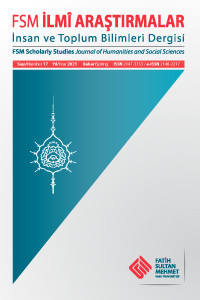Understanding the Spirit of Time and Interdisciplinary Perspective in the Interpretation of Ḥadīth
Interpretation; Ḥadīth Texts; Spirit of Time; Interdisciplinary Perspective
Hadis Yorumunda Zamanın Ruhunu Anlamak ve İnterdisipliner Perspektif
___
- Abū Dāvūd, Sulayman Bin Al-Ash‘as, “Sunan Abī Dāvūd”,Bayrūt, Dār alKitāb al-ʿArabī.
- Al-Bukhāry, Muḥammad Bin Ismāʿīl, Ṣaḥīḥ al-Bukhāry, 3rd edition, Ed. Muṣṭafā Dīb al-Bughā, Bayrūt, Dār Ibn Kathīr al-Yamāma.
- Al-Juwaynī, Abdul Mālik bin Abdullah, “al-Burhān Fī Usûl al-Fiqh”, Vafa, 1418.
- Al-Mubārakfūrī, Muḥammad Bin ‘Abdu Rahman bin ‘Abdu Rahim, “Tuhfatu al-Aḥwazī Bi Sharḥī al-Jāmī al-Tirmidhī”, Bayrut, Dār al-Kutub al-‘Ilmiy.
- Al-Qaraḍāwī, Yusuf, “al-Sunnah Maṣdrān lil Maʿrifah Wāl Haḍārah”, 2nd ed., Dār al-Shuruq.
- Al-Qaraḍāwī, Yusuf, “Kayfa Natʿāmal Maʿ al Sunnah”,2nd ed., United State of Amerika.
- Al-Qushayrī, Muslim Bin Ḥajjāj. Ṣaḥīḥ Muslim, ed. by Muhammad Fu’ad ʿAbd al-Bāqī. Bayrūt, Dār Ihyā al-Turath al-ʿArabī.
- Al-Shāṭbī, Ibrahim b. Mūsa, “Al-Muvāfakāt Fī Usūl al Fiqh”, (Dār al Marifah, Bayrūt).
- El-Naggar, Zaghloul, “Treasures in the Sunnah, A Scientific Approach, Part Two”, Cairo, Al-Falah Foundation, 2005.
- Hanioğlu, M. Şūkrū, “Max Weber - İslami Calvinistler”, Zaman Gazetesi: 02- 02-2006. http://www.zaman.com.tr/haber.do?haberno=252508
- Ibn ʿĀshūr, al-Ṭāhir, “Maqāṣid al-Shariyyah al-Islāmiyyah”, Dār al-Kitāb al-Miṣri & Dār al-Kitāb al-Lubnāni, 2011.
- Ibn Ḥanbal, Abū ‘Abd Allāh Aḥmad al-Shaybānī, “Musnad Aḥmad”, Egypt, Muʿassasat Qurṭubat, n.d..
- Ibn al-Qayyūm al-Jawziyya, Muḥamad, al-Ṭıbbu al-Nabawī, Ed. ʿAbidu alGhanī ʿAbd al-Khāliq, Bayrūt, Dār al-Fikr.
- Ibn Rajab, ʿAbd al-Rahmān, “Jāmiʿu Al-ʿUlūm wāl Ḥikam”, Bayrūt, Dār AlMaʿrifah, 1408 H..
- Karaman, Hayreddin, the article “Fakih” and “Fıkıh”, Türkiye Diyanet Vakfı İslam Ansiklopedisi, İstanbul, Türkiye Diyanet Vakfı Yayın Matbaacılık ve Ticaret İşletmesi.
- Masud, Muhammed Khalid, “Islamic Legal Philosophy: A Study of Abu Ishaq al-Shatibi’s Life and Thought”, Pakistan, Islamic Research Institute, 1977.
- Muḥammad b. Ibrāhim b. ʿAbd al-Laṭif Āl al-Shaykh, “Sharḥ Kashf al-
- ISSN: 2147-3153
- Başlangıç: 2012
- Yayıncı: Fatih Sultan Mehmet Vakıf Üniversitesi
Esmâ-i Hüsnâ’nın Tevkîfîliği veya Kıyâsîliği Hakkında Metodolojik Bir Çalışma
“İstiklâl Marşı”nın Kültürel Kodları ve Metinlerarası İlişkiler
Vekâlet Sözleşmesinin Kendine Özgü Sona Erme Sebepleri
Şaban KAYIHAN, Mustafa ÜNLÜTEPE
Faruk Nafiz Çamlıbel’in Han Duvarları Kitabı 2012 Baskısı Üzerine Bir Eleştiri
Devrinden Seyrine Sultan III. Murad’ın Kitâbü’l-Menâmât’taki Mektuplarına Dair Bazı Tespitler
Kavramların Çağırdıkları/Çağrıştırdıkları: Metinlerarasılık Bağlamında İstiklâl Marşı
Evkaf-ı İslamiye Müzesinin Kuruluşunun 100. Yılı ve Vakıf Müzeleri Paneli
Vekaletsiz İş Görmede İş Görenin Hukuki Durumu
“Merkad-i Fâtih’i Ziyâret”in Gizi ve Üzerindeki Göz İzi
